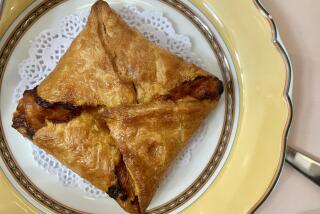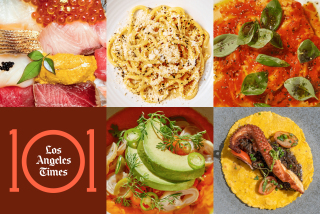Not your grandmother’s cooking: Who gets to cook what’s on your plate?
When it comes to food that’s identified with a specific culture, does a chef’s ancestry have to match what’s on the plate?
My name is Evan Kleiman, and I am not Italian. I am, however, a veteran of the Italian restaurant scene and a chef who specializes in cooking Italian food. So this is hardly a new question for me. Rather it’s one I’ve been thinking about since my early 20s, when my fluency with both the Italian language and la cucina italiana made many Italians I met think I was a creature from another planet. (This was the 1970s.)
I spent the ‘80s and ‘90s making simple Italian trattoria food at my Angeli restaurants here in Los Angeles and writing Italian cookbooks. The only folks who seemed to be disturbed were purveyors of very fancy Italian food. They wanted to run as far as possible from memories of la cucina povera; I’d been looking for a grandmother my whole life. And I had found her in kitchens all over Italy.
Occasionally, a regular customer would drag an Italian friend to Angeli, and I’d get that dreaded question — “How is it possible that you know how to cook this food?” — asked in tones equally aggressive and disbelieving when they realized I wasn’t from the homeland. But then I’d chat them up in Italian and share stories of my informal sessions “interning” with grandmothers, and they would relax and continue eating.
Every time I’ve been questioned about my ability to channel my inner nonna, I’ve simply shrugged and said that it’s what I’m meant to do. (My mother, on a trip we took together in Italy once, turned to me and said: “You’re different here. It’s like you belong.”)
Comments around culinary carpetbagging have — again — been gathering momentum lately. It’s a natural progression, as the second-generation children of immigrants move into kitchens as a choice to express something personal; they want to own the authenticity of their own culinary pedigree, and many of their parents or relatives or friends opened restaurants to survive when they first arrived. Often the food served was Americanized to be accepted by a wider audience.
This discussion is as much about identity as anything else. But that idea of identity is a slippery thing; sometimes a person’s culinary identity isn’t related to relatives. Thus, the grumbles about Pok Pok chef Andy Ricker, a non-Thai from Vermont, making Thai food. Valid, vital issues revolving around race and class, poverty and power are deeply embedded into these discussions.
But cooking is personal. And what makes a cook, and what that cook decides to express on the plate, is complicated — and it doesn’t rely solely on where you or your people are from. It’s a multilayered gestalt that involves personality, individual influences and a nearly pheromone-based attraction to a set of flavors and textures that is as ephemeral as the love between two people.
I learned how to make minestrone and ravioli from my chosen grandmothers — not borscht and kreplach from my actual one, who I was never fortunate enough to know. Maybe when the chef in question is of some general European descent and is making food of another European culture, there’s less questioning. I only know that in my case, I was besotted with Italy, bathing myself in the deep comfort and sense of belonging I found in its culture and cuisine. If someone had suggested I should transfer all that passion to a more ethnically appropriate Eastern European country — or Israel — I would have been devastated.
Who knows why a boy named Andy Ricker from Vermont felt as if he belonged in the streets of Chiang Mai, Thailand, and needed to express it by cooking the food. Or why Rick Bayless, from a fourth-generation Oklahoma restaurant family, showed up as a teenager in Mexico and felt at home. Why did I, a 17-year-old girl from Silver Lake, prefer to be helping old ladies in Perugia roll out pasta instead of dancing at the town disco?
But there it is, that connection of the soul to a food culture and place — despite names and grandmothers, actual or imaginary. I would say this is not cultural appropriation, but boundless cultural appreciation, fueled by curiosity as much as the heart and made notable by the occasional cook who has the ability to be fluent in food.
Kleiman ran Angeli Caffe for 27 years. She’s the longtime host of KCRW-FM’s “Good Food.”
ALSO:
My cookbook collection needs to be slimmed down. But how?
Andy Ricker’s Pok Pok brings a genuine taste of Thailand to L.A.
Mian restaurant has noodles like no one else in the San Gabriel Valley
More to Read
Eat your way across L.A.
Get our weekly Tasting Notes newsletter for reviews, news and more.
You may occasionally receive promotional content from the Los Angeles Times.






